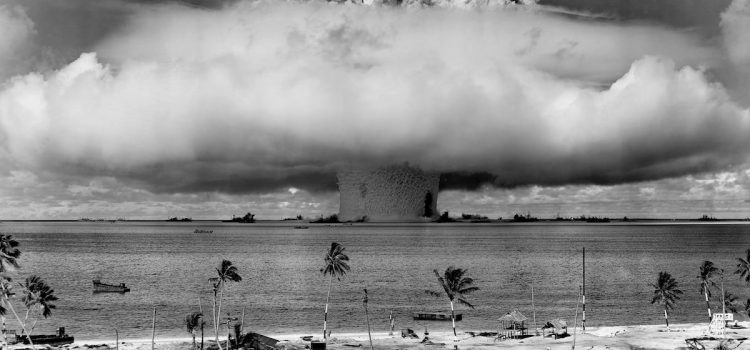
Why was J. Robert Oppenheimer chosen to lead the Manhattan Project? What was his attitude toward the work and its implications?
According to Kai Bird and Martin Sherwin, J. Robert Oppenheimer represents a modern-day Prometheus, the Greek Titan eternally punished for stealing fire from the gods and imparting it to humanity. Their book provides a comprehensive biography of the man best known for developing the atomic bomb.
Keep reading to learn about Oppenheimer and the Manhattan Project.
Oppenheimer and the Manhattan Project
At the outset, Oppenheimer and the Manhattan Project might have seemed like an unlikely pairing. As Bird and Sherwin argue, Oppenheimer consistently supported progressive causes throughout the 1930s, a fact that contributed to accusations of Communist activities. But, Oppenheimer’s interest in a broad range of progressive causes—from labor unions to the Spanish revolution—was upended by one event: Japan’s bombing of Pearl Harbor in December 1941. Rather than continue investing in these causes, Oppenheimer shifted his focus singularly toward the impending war with Germany and the other Axis powers (Japan and Italy).
(Shortform note: Oppenheimer’s response to the bombing of Pearl Harbor was shared by the vast majority of Americans. Indeed, experts argue that Pearl Harbor was a uniquely unifying moment in American history, as it united Americans against a common enemy that threatened to destroy the US altogether. For this reason, the Senate even voted unanimously to declare War against Japan, a rare act of consensus across party lines.)
The US government was initially reluctant to include Oppenheimer in the bomb project because of his past political associations. However, in 1941 Oppenheimer’s colleague at Berkeley, the renowned experimental physicist Ernest Lawrence, vouched for Oppenheimer and earned him an invite to early government meetings about the bomb. Then, in 1942, the government’s committee on nuclear weapons made Oppenheimer the leader of fast-neutron research, a key component of developing the atomic bomb. Having shown his worth, Oppenheimer was nominated by General Leslie Groves to direct the Manhattan Project (the US’s nuclear weapons project) in October 1942.
(Shortform note: Although the US spearheaded the Manhattan Project, Canada and Great Britain proved helpful collaborators. In particular, Canada’s uranium mines supplied the US government with tons of uranium ore, while Great Britain allowed 19 of its top scientists to relocate to America to join the Manhattan Project.)
We’ll examine Oppenheimer’s tenure as head of the Manhattan Project, focusing on three key areas: Oppenheimer’s initial justification for developing the atomic bomb, his evolving views on the bomb throughout World War II, and finally his arguments for the permissibility of bombing Japan.
Initial Rationale for Developing the Bomb
Despite the grave risks of creating a weapon of mass destruction, Oppenheimer approached his work as director of the Manhattan Project with verve. According to Bird and Sherwin, Oppenheimer did so because he worried that Nazi Germany would develop nuclear weapons before the US, making them effectively unstoppable.
Bird and Sherwin point out that Oppenheimer’s worry was shared by members of the US military and scientific community in the early 1940s. After all, German scientists were the first to discover that uranium atoms could be split in 1939—the key behind so-called “fission” bombs—and rumors abounded that Germany had taken control of Czechoslovakia’s uranium mines to acquire the uranium necessary for a bomb.
As for Oppenheimer himself, Bird and Sherwin cite many discussions with his friends showing the extent of his concern. For example, Hungarian-American physicist Edward Teller, who worked closely with Oppenheimer on the Manhattan Project, recalled Oppenheimer’s sentiment that developing an atomic bomb was necessary to defeat Hitler’s Germany.
(Shortform note: The widespread fear that the Germans would develop an atomic bomb before the Americans was unfounded. Experts note that the German bomb project never advanced beyond preliminary research, and its director—Werner Heisenberg—expressed total disbelief when he later heard that the US had successfully bombed Japan. According to these experts, the German bomb project was plagued by pervasive misorganization and insufficient institutional support, handicapping the project from the outset.)
Evolving Attitude as the War Progressed
Bird and Sherwin maintain that developments in the war led Oppenheimer to rethink his rationale for creating the atomic bomb. They relate that, by late 1944, it was evident that Germany was on the brink of defeat, making Oppenheimer’s original motivation moot. Consequently, Oppenheimer instead reasoned that the importance of transparency justified creating and testing the bomb, as the world deserved to know that nuclear weapons were possible.
According to Bird and Sherwin, Oppenheimer explained his reasoning in a March 1945 meeting of Manhattan Project scientists. As experimental physicist Robert Wilson recalled, Oppenheimer argued that, if the development of the bomb ceased, it would likely become classified military information. Because this option would leave inside knowledge about nuclear weapons in US hands alone, Oppenheimer instead thought the scientists were obligated to finish creating the bomb, so the rest of the world could understand the true impact nuclear weapons could have on future wars.
(Shortform note: Oppenheimer’s claim that the US military would classify information about the bomb if left unfinished is supported by the US’s extreme secrecy concerning the Manhattan Project—many members of the Manhattan Project themselves didn’t know they were contributing to developing the bomb. For example, chemists who purified uranium weren’t aware that their efforts were necessary to create uranium bombs, and administrative workers thought they were part of a mundane bureaucratic team.)
As Wilson and others present at the Manhattan Project meeting conveyed, Oppenheimer’s speech convinced his fellow scientists to complete the development of the atomic bomb. Several months later, on July 16, 1945—about three months after Hitler committed suicide and Germany surrendered—a successful test of the atomic bomb, known as Trinity, took place with the Manhattan Project’s scientists watching.
(Shortform note: Though the Trinity test was the world’s largest manmade explosion to date, with a yield of 15,000 to 20,000 tons of TNT, it pales in comparison to the nuclear weapons developed later. For comparison, Russia’s Tsar Bomba (a hydrogen bomb detonated in 1961) had a yield of 50 million tons of TNT, making its explosion some 2,500 times stronger than the first atomic bomb.)
Oppenheimer’s Views on Bombing Japan
Bird and Sherwin relate that, even before Trinity displayed the atomic bomb’s might, the US military was considering using the bombs on Japan, the final Axis power standing in World War II. Moreover, they note that Oppenheimer actively supported the decision to use the atomic bomb against Japan and even acquiesced to the military’s proposed targeting of civilians.
The clearest statement of Oppenheimer’s views, they write, stems from the Scientific Panel’s June 1945 memorandum to the Interim Committee (a military group advising the secretary of war). In this memorandum, Oppenheimer explicitly endorsed the military use of the bomb against Japan. He reasoned that one decisive bombing of Japan could serve as an effective deterrent against all future wars, thus justifying the bombing.
However, Oppenheimer differed from the military when it came to cooperating with foreign powers. Bird and Sherwin point out that, along with his other panel members, Oppenheimer urged transparency with other international powers—including the Soviet Union. He reasoned that secrecy about the US’s nuclear weapons could spark a deadly arms race and that radical candor was the best route to avoiding this arms race.
(Shortform note: Oppenheimer’s proposal for transparency with the Soviet Union was especially radical at the time since the US remained suspicious toward the Soviets despite fighting alongside them in World War II. In particular, the US government and public were concerned about the Communist Party and Premier Joseph Stalin’s despotic regime, which US politicians viewed as a potential threat post World War II.)






